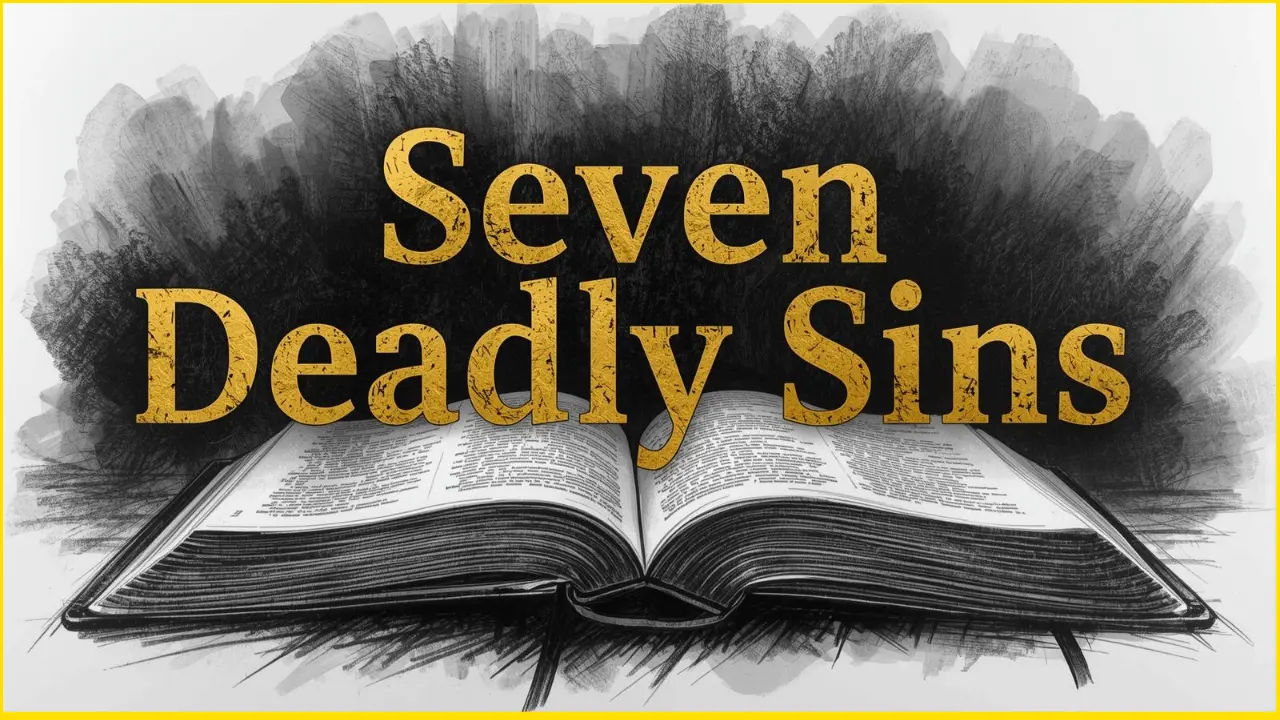People search for the seven deadly sins to gain clarity. Lust, greed, pride, envy, wrath, sloth, and gluttony reveal the inner struggles that shape our spiritual life.
Though the Bible never lists them together, early Christian teachers recognized these patterns as struggles that distance the heart from God—and understanding them helps us seek healing and grace.
Quick Summary of the 7 Deadly Sins
| Sin | Simple Meaning | Key Bible Reference |
|---|---|---|
| Pride | Believing we do not need God | Proverbs 16:18 |
| Envy | Resenting another’s blessing | Proverbs 14:30 |
| Wrath | Harmful anger that destroys | Ephesians 4:31 |
| Sloth | Avoiding responsibility or spiritual growth | Proverbs 13:4 |
| Greed | Never feeling satisfied with what we have | Luke 12:15 |
| Gluttony | Excess beyond need, driven by escape | Proverbs 23:20–21 |
| Lust | Desire that overpowers peace | Matthew 5:28 |
Ranked: The Seven Deadly Sins from Most to Least Dangerous
Christian tradition ranks them by how deeply they affect the heart:
- Pride
- Envy
- Wrath
- Sloth
- Greed
- Gluttony
- Lust
Pride stands at the top because it is the root that feeds the others.
1. Pride — The Root of Every Other Sin

Pride whispers that we know best.
It convinces us that we do not need God, guidance, or correction.
It turns the heart inward and closes it to transformation.
Bible: “Pride goes before destruction.” — Proverbs 16:18
Modern example:
Rejecting advice, refusing to apologize, or defending an argument even after realizing you are wrong.
Spiritual meaning:
Pride builds walls. Humility builds bridges.
2. Envy — The Quiet Poison of Comparison
Envy does not simply want what someone has.
Envy feels hurt that they have it at all.
It steals joy and blinds us to our own blessings.
Bible: “Envy rots the bones.” — Proverbs 14:30
Modern example:
Feeling irritated when someone else succeeds, marries, travels, or glows.
Spiritual meaning:
Envy shrinks the soul. Gratitude expands it.
3. Wrath — When Anger Turns Destructive
Healthy anger protects.
Wrath destroys.
Wrath uses words, silence, or actions to wound rather than heal.
Bible: “Let all bitterness, rage, and anger be put away.” — Ephesians 4:31
Modern example:
Exploding emotionally, using insults, or punishing through withdrawal.
Spiritual meaning:
Wrath breaks what love is trying to build.
4. Sloth — Spiritual Sleepiness, Not Laziness
Sloth is often misunderstood.
It is not avoiding work—it is avoiding responsibility, purpose, and spiritual growth.
Bible: “The soul of the lazy person desires and has nothing.” — Proverbs 13:4
Modern example:
Ignoring prayer when the heart feels heavy.
Delaying important life changes because they demand effort.
Spiritual meaning:
Sloth slows the soul until growth becomes impossible.
5. Greed — The Endless Hunger for More
Greed is not only about money.
It is the thirst for more power, recognition, validation, or control.
Bible: “Life does not consist in the abundance of possessions.” — Luke 12:15
Modern example:
Working endlessly with no rest, not from passion but from fear of losing.
Spiritual meaning:
Greed empties life of contentment and blinds us to God’s provision.
6. Gluttony — Excess That Numbs the Heart
Gluttony is consuming too much—food, entertainment, pleasure, social media, anything.
It is not about appetite. It is about escape.
Bible: Proverbs 23:20–21 warns about excess and lack of self-control.
Modern example:
Binge-watching to avoid problems.
Turning to food for emotional comfort.
Spiritual meaning:
Gluttony fills the body but empties the spirit.
7. Lust — Desire That Overpowers Peace
Lust is desire without boundaries.
It treats people as objects rather than souls.
Bible: “Anyone who looks with lust commits adultery in the heart.” — Matthew 5:28
Modern example:
Uncontrolled digital temptation.
Relationships built on attraction rather than love.
Spiritual meaning:
Lust distorts the meaning of intimacy and weakens purity of heart.
Historical Background: How the Seven Deadly Sins Developed

- Evagrius Ponticus (4th century) identified eight destructive thoughts.
- Pope Gregory I (6th century) refined them into seven categories.
- Thomas Aquinas (13th century) gave them theological depth in Summa Theologica.
- Medieval teachers and artists spread them through Europe.
This long formation explains why the list remains spiritually influential today.
How the Seven Deadly Sins Show Up in Daily Life
The seven deadly sins are rarely dramatic.
They appear slowly and quietly:
- Pride in defensiveness
- Envy in comparison
- Wrath in sharp words
- Sloth in spiritual drifting
- Greed in constant anxiety about “more”
- Gluttony in using excess to avoid emotion
- Lust in seeking validation through desire
Naming them helps us confront them with honesty.
Why These Sins Are Called “Deadly”
They are deadly because they harm what is most alive within us:
- joy
- peace
- gratitude
- clarity
- relationships
- purpose
- spiritual sensitivity
These sins drain the soul long before they produce any outward consequences.
The 7 Virtues That Heal the 7 Deadly Sins
| Deadly Sin | Healing Virtue | Meaning |
|---|---|---|
| Pride | Humility | Seeing ourselves honestly before God |
| Envy | Kindness | Celebrating others sincerely |
| Wrath | Patience | Responding gently and thoughtfully |
| Sloth | Diligence | Choosing growth over comfort |
| Greed | Generosity | Giving with joy |
| Gluttony | Temperance | Practicing balance |
| Lust | Chastity | Honoring people as souls |
Spiritual transformation happens when we replace the harmful pattern with its healing opposite.
What Jesus Teaches About These Sins
Jesus addressed every one of these attitudes:
- Pride → Matthew 23:12
- Envy → Older brother in Luke 15
- Wrath → “Blessed are the peacemakers”
- Sloth → Parable of the talents
- Greed → Parable of the rich fool
- Gluttony → Warning against excess
- Lust → Heart-level purity
Christ shifts focus from behavior to inner transformation.
Are the Seven Deadly Sins Unforgivable?
No.
These sins represent human weakness, not eternal condemnation.
God forgives:
- pride that bows
- envy that chooses gratitude
- wrath that softens
- sloth that wakes up
- greed that learns to give
- gluttony that seeks balance
- lust that seeks purity
Grace is always greater than the struggle.
7 Prayers to Break the Power of Each Deadly Sin
Against Pride:
“Lord, teach me humility that honors You above my ego.”
Against Envy:
“Help me celebrate others without shrinking inside.”
Against Wrath:
“Give me a calm spirit and slow speech.”
Against Sloth:
“Awaken my heart and strengthen my discipline.”
Against Greed:
“Create a generous spirit within me.”
Against Gluttony:
“Help me find rest in You, not in excess.”
Against Lust:
“Purify my mind and teach me to love honorably.”
7 Daily Practices to Fight the Seven Deadly Sins
- Begin the day with a short humility prayer.
- List five things you are grateful for.
- Practice slow responses when angry.
- Finish small responsibilities faithfully.
- Give something generously each week.
- Limit excess consumption—food, screens, pleasure.
- Guard your eyes and mind with intentional choices.
These habits slowly reshape the inner world.
What the Seven Deadly Sins Teach the Soul
The seven deadly sins are not ancient rules.
They are mirrors.
They show us where the heart struggles, where wounds remain, and where grace is needed.
Each sin reveals a place where the soul feels weak, and each meaning points to a God who restores, strengthens, and renews.
The goal is not perfection.
The goal is transformation—honest, slow, steady, and Spirit-led.
If you want to go deeper, read your repentance-focused guide: 5 Short Prayers of Repentance for Forgiveness Anytime
For deeper exploration of morality and ethics, the Stanford Encyclopedia of Philosophy provides insightful perspectives into human behaviour and values.
Frequently Asked Questions
What are the seven deadly sins in order?
The seven deadly sins are traditionally listed as: pride, greed, wrath, envy, lust, gluttony, and sloth. They are considered the root of many other sins and vices.
Who created the concept of the seven deadly sins?
The concept originated with early Christian monks, particularly Evagrius Ponticus in the 4th century. Later, Pope Gregory I in the 6th century formalized the list into the seven sins we know today.
Why are they called “deadly” sins?
They are called “deadly” because they were believed to endanger the soul and lead to spiritual death if left unrepented. Each sin was seen as a gateway to more destructive behaviors.
Which of the seven deadly sins is considered the worst?
Pride is often regarded as the worst because it is seen as the root of all other sins. Many theological traditions describe pride as the sin that led to Lucifer’s fall from heaven.
Are the seven deadly sins mentioned in the Bible?
No, the Bible never explicitly lists the seven deadly sins. However, passages such as Proverbs 6:16–19 and teachings in the New Testament highlight behaviors closely related to them.

